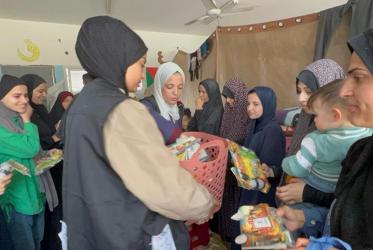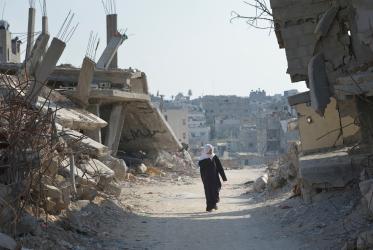1. In an alarming appeal regarding the plight of the people of Gaza, the Heads of Churches in Jerusalem on 22 January 2008 warned that, "one and a half million people are imprisoned and without proper food or medicine; 800,000 without electricity supply. This is illegal collective punishment, an immoral act in violation of international law. This cannot be tolerated any further. The siege over Gaza should end now".
2. The humanitarian, human rights and political situation of the people of Gaza has been grave for years and is steadily worsening. The logic of policies imposed upon this tiny strip of territory is being pushed to new extremes. Public order is further threatened by pressures from within. The horizon for those who live in one of the most densely populated places on earth seems to shrink by the day.
3. In addition to the humanitarian needs noted above by the churches in Jerusalem, United Nations, non-governmental and church-related organizations working in the Gaza Strip report that more Gazans than ever - 80 percent of households - live below the poverty line and need food and direct assistance; that fuel shortages are crippling essential services including sanitation and water supplies; that life-saving treatments are not available in local hospitals; that baby milk and cooking oil are scarce; that many public facilities have been destroyed by military attacks and that schools lack basic educational materials; that hundreds of businesses have gone bankrupt, half of the workforce is jobless and the economy is in collapse. While there is a need to move from meagre humanitarian aid to serious developmental assistance, some agencies have referred to the help allowed in from the outside world as a "drip-feed" of humanitarian aid.
4. Human rights violations exacerbate the humanitarian situation and have escalated with recent escalations in violence. "The right to life is imperilled for all in the region," UN High Commissioner for Human Rights, Louise Arbour, reported to a special session of the Human Rights Council last month. She noted that armed violations of the laws of war had killed seven civilians in nearby Israel last year where two towns are subjected to indiscriminate rocket attacks by militants in Gaza. She also reported that 131 Palestinian civilians were killed last year in attacks by Israeli forces on Gaza in targeted killings and in the use of disproportionate force.
5. Commissioner Arbour said that Palestinians generally, and especially the residents of Gaza, "are systematically deprived of the enjoyment of almost all their human rights and basic needs". The movement of people, goods and services to and from Gaza is greatly restricted, especially along the border with Israel. Assessing the right to food, the World Food Programme reports that basic food imports are only half what is required. Regarding the right to health, the World Health Organization reports that the blockade's impact seriously compromises health services and related infrastructure. The rights of work, education and adequate housing are also at risk.
6. All the authorities directly involved, the de facto Hamas authority and the Palestinian authority - to the extent that they exercise control - as well as the government of Israel, have primary obligations to protect the population of Gaza under international human rights and humanitarian law. Other governments are indirectly involved, such as European Union members paying for the reduced ration of fuel.
7. Rather than accept the isolation and punishment of Gaza, it is in the interests of all parties involved to work out the political reintegration of Gaza with the rest of the occupied Palestinian territory. Any credible peace process must allow for reconciliation between Palestinian parties and involve all the elected representatives of the Palestinian people. Meanwhile, the launching of rockets, suicide bombings, the targeting of civilians, as well as the collective punishment of Gaza, and other actions such as settlements, road blocks, indefinite detentions and killings without trial, do not and will not make for peace.
8. Accordingly, as the World Council of Churches we express our deep sadness at the humanitarian situation in Gaza, increasing alarm at the incessant violations of human rights and on-going losses of life among Palestinians and Israelis, and grave concerns at the future of the peace process for both Israel and Palestine. A chorus of international concern is calling for an end to the blockade of Gaza and reminding the government of Israel that collective punishment is prohibited by the Geneva Convention that governs its conduct in Gaza. We join our voices to these calls for mercy and justice, again. We do so today and for as long as the suffering continues, believing that a future for all can and will be found.
9. The Amman conference was called to spur us to work for peace, because people living under and with endemic injustice still yearn for a just peace despite 60 years of conflict and despair. The "Amman Call" commits us with the churches of the Holy Land in the Middle East to "act and pray and speak and work and risk reputations and lives to build with them bridges for an enduring peace among the peoples of this tortured and beautiful place".
The central committee of the World Council of Churches, meeting in Geneva, Switzerland, 13-20 February 2008:
A. Calls urgently, with the churches of the Holy Land, and with the Middle East Council of Churches, for an immediate lifting of the blockade of Gaza;
B. Requests member churches to continue to remind the government of Israel of the need to fulfil its international obligations as an occupying power, under the Geneva Conventions, to guarantee the provision of food, medicine, fuel and water supplies and essential services, such as electricity and sanitation, to the Gaza Strip;
C. Recognizes that civilians are being attacked and killed in both Israel and the occupied Palestinian territories and reiterates its absolute condemnation of attacks on civilians;
D. Charges member churches to watch that all authorities exercising control and governmental functions in and over Gaza respect international human rights law and international humanitarian law and encourage them to fulfil its requirements;
E. Calls member churches to speak out for the people of Gaza, in public and with their governments, calling for an end to the siege, an end to the collective punishments and a negotiated ceasefire;
F. Commends churches and church-related organizations working to stop third-party governments, such as the European Union and the United States, from providing financial assistance to the occupying power for actions concerning Gaza that are wrongful and illegal under international law; and further recommends that other churches take up such entreaties to governments involved;
G. Calls the fellowship of churches in the WCC to pray for an end of the suffering in Gaza and progress toward a just and lasting peace between Palestinians and Israelis;
H. Invites member churches of the WCC to receive and affirm the "Amman Call" of June 2007 that launched the Palestine Israel Ecumenical Forum and to come together in advocacy for peace under the forum, including the Ecumenical Accompaniment Programme in Palestine and Israel, debating theological positions related to the conflict, and a global week of International Church Action for Peace in Palestine and Israel, 4-10 June 2008.




